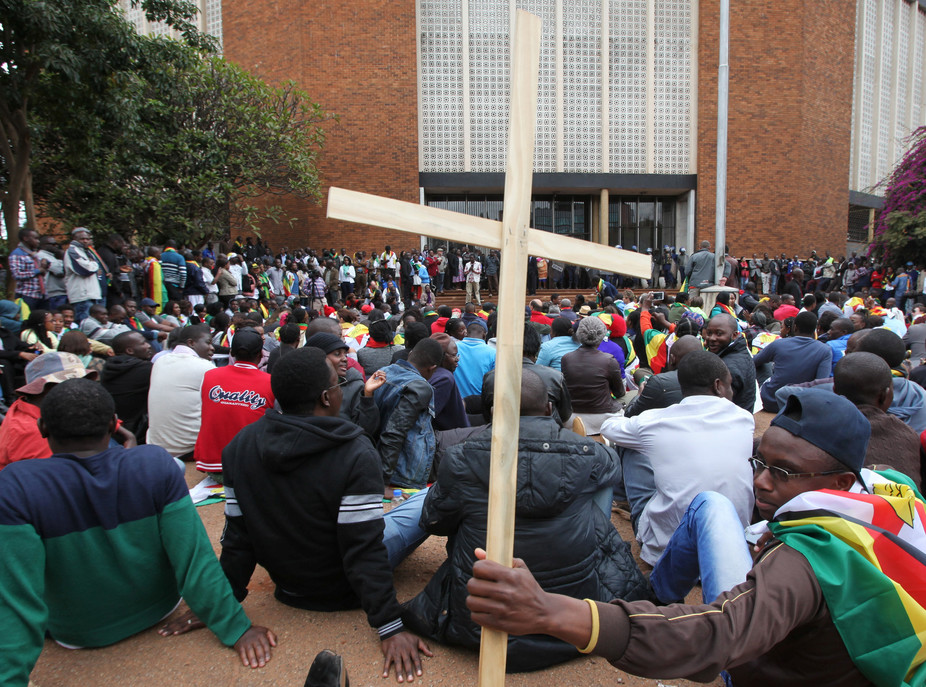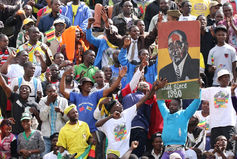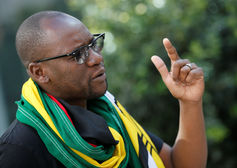PBS: Escaping Eritrea … [Read More...] about ካብ ውሽጢ ቤት ማእሰርታት ኤርትራ
Zimbabwe’s interregnum: new wine, old bottles?

Analysts have celebrated July’s events in Zimbabwe as indications of a vibrant and social media-based new citizenry with possibilities of leading an African Spring. Like the Arab one, but successful.
Some invoke the generation of “born-frees” – those born after Zimbabwe’s liberation in 1980 – as a new political force. Others suggest that the public stayaways and vendors’ protests are evidence of the informal sector’s new power. More still herald the political arrival of the “middle class”, not forgetting that teachers and nurses’ unions instigated the first stayaway with their strike for delayed pay.
Religious leaders too are pegged as leaders of Zimbabwe’s renaissance amid an economic meltdown and the imminent disappearance of the dollar. Or they are seen as heralds of change within the ever fracturing but still ruling Zimbabwe African National Union – Patriotic Front (ZANU-PF).
The new forms of protest raise the possibility that the long-simmering Zimbabwean crisis may have reached boiling point.
The time could indeed be ripe for a unique form of politics. This, as more formal modes of political opposition have split into factions after their failure to take power from those much better at the chicanery and coercion of Zimbabwe’s electoral game, and the leader of the still-largest challenger, the Movement for Democratic Change (MDC), Morgan Tsvangirai, battles cancer.
There is no doubt that July’s brave protests – which were met with the expected doses of violence and intimidation from the country’s increasingly embattled rulers – and the hundreds defending Pastor Evan Mawarire at Harare’s courts indicate profound alterations within Zimbabwe’s body politic.
Combined with the public indictment of Robert Mugabe by the “war vets” and a group of wise Zimbabwean political veterans called the Platform for Concerned Citizens testing the idea of a National Transitional Authority, it seems clear that big changes will happen soon.

That is unless the global guardians of monetary rectitude – the International Monetary Fund – bail out Zimbabwe’s ruling party by the end of September so that soldiers and other civil servants can be paid regularly.
Notwithstanding, the “non-party” nature of the protests and their social-media based preludes suggest new, non-hierarchical and non-elite political modes arising: all very hopeful for a country – and a world – tired of old-style rule.
Lessons from Zimbabwe’s political history
It might be wise, though, to join at least one sceptical observer cautioning against excessive exuberance. It could be more instructive to focus on Zimbabwe’s own political history instead of comparing its uprisings to any internationally.
Thus, calculations on the ratio of new and old wine within similarly mixed bottles might lead to accurate judgments about their potency. The blends could be far more volatile than the promulgators of peaceful revolution could dream.
Zimbabwe’s political past reminds us that new players enter its power struggles when cracks appear within the old leadership. The new actors become intricately and inextricably imbricated in these conflicts, interlaced as they are with the dialectics of identity, ideology and plain old internecine competition. As the cracks turn into vacuums it usually takes a good dose of violence to turn the corner.
If new entrants arrive into these vortexes with their eyes wide shut they will simply be incorporated into the old patterns rather than transforming them. Can they learn from history in order to (re)make it? Can – as Karl Marx might have put it – the tragedies of the past not be repeated as farce?

Think of the early days of Zimbabwean nationalism and its progression to the eve of liberation. As the founding party, the Zimbabwean African People’s Union (ZAPU) led by Joshua Nkomo, split and ZANU emerged, youth enthusiastically threw stones and firebombed houses. Trade unionists nearly killed each other as they lined up behind the two parties.
A decade later, a group of young militants in ZAPU’s military camps in Zambia tried to solve some of their leaders’ conflicts over military strategy, political tactics, and ethnicity. The young cadres’ 1971 “March 11 Movement” tried to force the elder politicians to a conference to iron out these problems, but their tactics failed them. More than 40 young leaders were rounded up by the Zambian army and incarcerated in Zambia’s prisons for more than three years, until exiled to the UK while the “détente” exercise unfolded as Angola and Mozambique’s release from Portuguese rule galvanised regional actors to moderate the Zimbabwean nationalists’ quest. Many more “rebels” were sent to Rhodesia to a much worse fate.
Until today, many of the old guard believe these young Turks were acting at the behest of those who hived off to form the short-lived Front for the Liberation of Zimbabwe, or FROLIZI. In any case, ZAPU never fully recovered its national character.
The 1974 détente exercise produced more examples of “new entrants” – and their neutralisation. The Nhari rebellion – quelled ruthlessly – combined with the release of the first generation of nationalists from Salisbury’s prisons led almost inexorably to Lusaka-based National Chairman Herbert Chitepo’s assassination. It took Robert Mugabe nearly two years to fill the vacuum.
Much of that time was taken up by his sidelining another group of young militants who took the war to a new level while trying to unite the contending nationalist armies and forging the struggle on a firmer ideological footing than the older leaders’ fragile one. These young militants spent three years in Mozambique’s prisons for their troubles: international interlocutors (then, as now, always watching and intervening, often welcomed from inside) portrayed them as “Karanga” columns also prone to Soviet designs.
What do these brief notes from the past illuminate about the present?
New wine and new bottles needed
Whether the protagonists know it or not, “new struggles” are always tightly tied to old ones dominated by internecine competition (which infuses new parties too) within the ruling party or its offshoots.
It’s hard to tell how many fractions of the fracturing ruling party and the state apparatuses woven into it have hands in the “new” protests. But the viral video (from inside a police van) of police beating demonstrators suggests cracks in the gendarmerie. The police commissioner, who was a victim of a 1978 crackdown against supposed plotters within ZANU, knows these stories well.
As the contest for the throne becomes even more intense while the economic crisis deepens, the “new citizens” must weigh their options, and the role they can play in new political configurations, very carefully.
Do they have to make choices between the two main factions in ZANU-PF? Would that be “Generation 40”, supporting the first lady, Grace Mugabe, to prepare a Mugabe dynasty they hope to manage? Or would they choose ZANU-PF Vice-President Emmerson Mnangagwa and his backers, the so-called “Lacoste” group and the rebellious group of war veterans, all taking on an anti-Mugabe veneer of democratic decency while harbouring designs for “order” that appear more enticing than ever for . Is the Zimbabwe People First party more than it appears (a place for jilted ZANU-PFers)?
And can any of the two Movement for Democratic Change parties or Tendai Biti’s People’s Democratic Party recover the social democratic glories of 1999? As Leo Zeilig reminds us, the lead-up to the MDC’s birth at the turn of the millennium was not unlike today – but the endpoint keeps receding.
Zimbabwe’s new citizens will have to strategise very carefully. The compromises and alliances will not be easy. But they must bring new wine and new bottles to Zimbabwe’s very barren political table.
